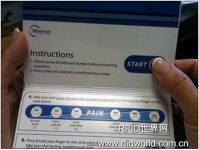
RFID pain management diary helps track patients’ pain
[ad_1]
A few days ago, Meridian Health conducted a pilot test in five hospitals and a home care service facility in New Jersey to try out a set of RFID pain management product Impak Health Journal for Pain. The product was jointly developed by Meridian and chip company Cypak, and the new company Impak Health jointly established by the two companies is responsible for marketing. There are currently about 22 patients participating in the test. Health Journal for Pain is an RFID folding card with several questions about patient pain management printed on it. Patients can respond to the questions through the buttons on the card. Later, the card is placed on an RFID reader and the answers are uploaded to a database so that doctors can obtain information about the patient’s pain.

Impak Health Journal for Pain
At the beginning of this year, Meridian started to develop this system in cooperation with Cypak, hoping to provide better pain management services for patients with chronic diseases, so that doctors can have a clearer understanding of patients’ daily pain at home. Meridian Health is located in central New Jersey, where the proportion of elderly people is higher than in other parts of the United States-about 25% of the population is over 65, he said. With the aging of the population, the pressure on hospitals and doctors is increasing. “This has prompted us to find new solutions, such as how to reduce the chance of patients going to the hospital while strengthening contact with patients,” she said.
In order to improve the medical management of patients with chronic diseases and make them more independent and safe, the hospital hopes to use technology to track the health and symptoms of patients. In the past, doctors asked patients to record their pain diaries on paper, and doctors then decided on the next stage of treatment and medication based on the diaries. However, many patients feel that paper records are too troublesome. As a result, when they visit the doctor, they only rely on their own memory to inform the doctor of the pain.
The new product realizes the digitization of the pain recording process, and Meridian tested the system in June this year. Each patient who participated in the test received a Health Journal for Pain. The product was about the size of a pocket, folded into three pieces, and a series of question and response buttons were printed on it. The 13.56 MHz RFID inlay supplied by the battery in the diary can store and send data to a reader. The RFID inlay supports 13.56 MHz NFC and ISO 14443-A RFID specifications, developed and provided by Cypak.
When the patient is taking daily analgesics or higher (sudden abnormal pain), and one hour after taking the medicine, press the button to answer their pain level. The patient can also rate his or her pain level from 0 to 10 once a week. When the button is successfully pressed, the card emits a “didi” indicator sound. The data is stored in the RFID tag, and the tag memory can store 72 days of pain reports.
When the patient came to the two doctors’ offices participating in the test, he or she placed the card on a desktop Continua Certified Smart Cable reader (developed by Cypak). The reader obtains the unique ID code of the diary tag, as well as all pain reports and medication records. The staff then plugs the reader into the USB port of a computer, and the computer’s Impak software downloads and displays the report results, said Albert Baker, director of Cypak’s South American Strategic Alliance. The pilot was launched in June and will last until October. 200 patients will participate before the end of the project.
Starting this week, Elliot said that Meridian Health will also install the system in patients’ homes. The patient must be equipped with a computer and Internet connection so that the data can be uploaded to the database at home.
The patient can place the card on the reader at certain time intervals-the same as the scene in the doctor’s office-the reader obtains the tag ID code and the stored data, and forwards them to the computer software. The computer then sends the information via the Internet to a server hosted by Meridian Health, so that the doctor can view the patient’s pain record. If an abnormal event occurs, the software will issue an alert, either on the screen of a Meridian employee, or sent to the patient’s family member or caregiver in the form of an email or text message.
In the future, Elliot said, Impak also plans to provide other versions of the diary, such as testing blood sugar or blood lipid levels, and this information is sent to the hospital’s server through an NFC reader.
So far, Elliot said that this plan is very effective, can clearly reflect the patient’s pain, and help doctors make better judgments. The vast majority of patients participating in the test are over 85 years old.
[ad_2]


